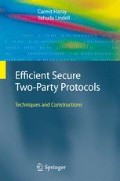Abstract
In this chapter, we present Yao’s protocol for secure two-party computation in the presence of semi-honest adversaries. The protocol has a constant number of rounds, and works by having the parties evaluate an “encrypted” or “garbled” circuit such that they learn nothing from the evaluation but the output itself. In particular, all intermediate values in the circuit evaluation (which can reveal more information than is allowed) remain hidden from both parties. We present the protocol for the case of a deterministic, non-reactive, single-output functionality. As we have shown in Section 2.5, this suffices for obtaining the secure computation of any probabilistic, reactive two-party functionality at approximately the same cost.
Access this chapter
Tax calculation will be finalised at checkout
Purchases are for personal use only
Preview
Unable to display preview. Download preview PDF.
References
C. Dwork, M. Naor and O. Reingold. Immunizing Encryption Schemes from Decryption Errors. In Eurocrypt’04, Springer-Verlag (LNCS 3027), pages 342–360, 2004.
B. Pinkas, T. Schneider, N. P. Smart and S. C. Williams. Secure Two- Party Computation Is Practical. In ASIACRYPT 2009, Springer- Verlag (LNCS 5912), pages 250–267, 2009.
Y. Lindell, B. Pinkas and N. Smart. Implementing Two-Party Computation Efficiently with Security Against Malicious Adversaries. In Conference on Security and Cryptography for Networks, pages 2–20, 2008.
O. Goldreich. Foundations of Cryptography: Volume 2 – Basic Applications. Cambridge University Press, 2004.
M. Naor, B. Pinkas and R. Sumner. Privacy Preserving Auctions and Mechanism Design. In the ACM Conference on Electronic Commerce, pages 129–139, 1999.
S. Even, O. Goldreich and A. Lempel. A Randomized Protocol for Signing Contracts. In Communications of the ACM, 28(6):637–647, 1985.
M. Rabin. How to Exchange Secrets by Oblivious Transfer. Tech. Memo TR-81, Aiken Computation Laboratory, Harvard University, 1981.
Author information
Authors and Affiliations
Corresponding author
Rights and permissions
Copyright information
© 2010 Springer-Verlag Berlin Heidelberg
About this chapter
Cite this chapter
Hazay, C., Lindell, Y. (2010). Semi-honest Adversaries. In: Efficient Secure Two-Party Protocols. Information Security and Cryptography. Springer, Berlin, Heidelberg. https://doi.org/10.1007/978-3-642-14303-8_3
Download citation
DOI: https://doi.org/10.1007/978-3-642-14303-8_3
Published:
Publisher Name: Springer, Berlin, Heidelberg
Print ISBN: 978-3-642-14302-1
Online ISBN: 978-3-642-14303-8
eBook Packages: Computer ScienceComputer Science (R0)

